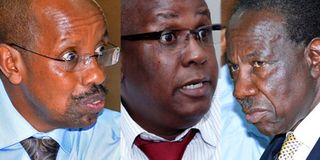Missing medicines cash sparks Shs15O billion loan saga

From L-R: Treasury Secretary Keith Muhakanizi, NMS General Manager Mose Kamabare and Finance minister Matia Kasaija
What you need to know:
The bank has so far released $72.1m of which $42.7m was meant for the purchase of medicines under National Medical Stores (NMS); $26.4m for settlement of contractors’ invoices under the rural electrification programme, and transport sector and $2.8m for the importation of earth moving equipment from Japan.
KAMPALA. Acting on a tip-off from National Medical Stores, the President and lawmakers have asked ministry of Finance officials to account for millions of dollars they received from an African bank for the procurement of medicines and other medical supplies.
Sunday Monitor understands that what a whistle-blower has called ‘missing funds amounting to $42m (more than Shs150b) was part of the $200m (about Shs700b) loan sourced from the Eastern and Southern African Trade and Development Bank (PTA Bank) to fund foreign exchange expenditure requirements of government as and when they arise.
The bank has so far released $72.1m of which $42.7m was meant for the purchase of medicines under National Medical Stores (NMS); $26.4m for settlement of contractors’ invoices under the rural electrification programme, and transport sector and $2.8m for the importation of earth moving equipment from Japan.
Although the whistleblower focused on medicines cash meant for the NMS, Sunday Monitor could not independently verify whether other intended beneficiaries (transport and power sectors) received their share. The lawmakers led by Dokolo MP Cecilia Ogwal, have since demanded for a wider investigation into the missing funds from PTA Bank and the accountability of the funds earmarked for medicines.
On Thursday, State Minister for Planning, Mr David Bahati, faced hard time on the floor of Parliament as he tried to explain the missing medicines funds. “We do apologise for delaying to solve the issue of NMS but that is the situation and I cannot tell you less than the truth,” Bahati said.
The truth, Bahati said, was that government has instructed the NMS to go ahead and procure the medicines to cater for the shortfall. However, NMS General Manager Mose Kamabare told Sunday Monitor last week that there would be no medicines for about 3,000 health centres across the country.
“We have never received that PTA Bank money you’re talking about. They (Finance officials) asked for documents and we gave them everything but they did not give us the funds,” Mr Kamabare told Sunday Monitor at the weekend.
To avert a crisis arising from a Shs68b hole in the NMS budget for the purchase of essential medicines and other medical supplies, Parliament in April 2016 approved the PTA loan facility. The budget shortfall arose from the depreciation of the shillings against the dollar in the 2015/16 financial year.
State House sources told Sunday Monitor that a government official leaked several documents on the “missing dollars” and pushed for an investigation into what MPs have called “a financial scandal” in the ministry of Finance. Some of the documents include: letters from Finance minister Matia Kasaija, Secretary to the Treasury Keith Muhakanizi and his deputy Patrick Ocailap; health minister Ruth Aceng, NMS boss Moses Kamabare electronic funds transfer (EFT) records and the April 26 Hansard that approved the disputed loan.
Sunday Monitor understands that the President got concerned after NMS officials complained to him that a Shs68b hole in the medicines budget had morphed into a cash crisis that was going to hurt some of the country’s most vulnerable citizens in public hospitals and health centres across the country.
On May 26 2016, State House wrote to Mr Muhakanizi about the challenges at NMS and in his response promised to provide the required funds for the medicines. Mr Muhakanizi also instructed NMS to provide the break down by medicine both in quantity and monetary terms. And three months later, Mr Muhakanizi wrote to NMS asking for copies of procurement contracts to process the disputed loan from PTA Bank. NMS’ foreign exchange requirements amounted to more than $42.8m (over Shs150b).
The bank released the funds to Finance ministry through Bank of Uganda but it did not go to NMS. It’s not clear who took the money. For instance, documents Sunday Monitor has seen show that on November 7 2016, PTA Bank released $30m (about Shs108.6b) and an additional $12.7m (Shs46b) was released on November 11 2016. When contacted at the weekend to explain who took the money for medicines, BoU spokesperson Christine Alupo requested for time to get the details.
Although the funds for the purchase of medicines, equipment and accessories was released in November last year, Mr Kasaija, on April 27 asked NMS to procure medicines and supplies on credit and promised that the funding gap of more than Shs40b “will take the first call on the 2017/18 budget”.
However, on March 27, NMS’ Kamabare wrote to the Ministry of Health Permanent Secretary, Dr Diana Atwine, complaining that under the Public Finance and Accountability Act, it is an offence to commit government without funds in the budget.
It is not yet clear why Mr Kasaija and the technocrats in the Ministry of Finance did not release the money for medicines they received from the PTA Bank.
It is also not clear whether the Shs150b for medicines is still in BoU or not, six months after PTA Bank released the funds. But after reviewing the documents, the President and MPs have demanded for the accountability of the funds. Speaker Rebecca Kadaga has asked the Finance minister to present a statement on Wednesday.
“We would like to know why money received in November 2016 has never reached NMS to date, yet the Health sector was the main driver for the loan, we want an explanation,” Kadaga demanded.




